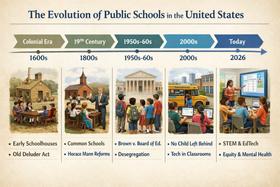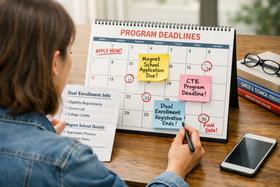Serving 975 students in grades 6-8, Twin Lakes Academy Middle School ranks in the bottom 50% of all schools in Florida for overall test scores (math proficiency is bottom 50%, and reading proficiency is bottom 50%).
The percentage of students achieving proficiency in math is 38% (which is lower than the Florida state average of 52%). The percentage of students achieving proficiency in reading/language arts is 38% (which is lower than the Florida state average of 52%).
The student-teacher ratio of 20:1 is higher than the Florida state level of 17:1.
Minority enrollment is 71% of the student body (majority Black), which is higher than the Florida state average of 65% (majority Hispanic and Black).
Quick Facts (2026)
- Grades: 6-8
- Enrollment: 975 students
- Student-Teacher Ratio: 20:1
- Minority Enrollment: 71%
- Overall Testing Rank: Bottom 50% in FL
- Math Proficiency: 38% (Btm 50%)
- Reading Proficiency: 38% (Btm 50%)
- Science Proficiency: 48% (Btm 50%)
- Source: National Center for Education Statistics (NCES), FL Dept. of Education
Top Rankings
Twin Lakes Academy Middle School ranks among the top 20% of public schools in Florida for:
Category
Attribute
Diversity
School Overview
Twin Lakes Academy Middle School's student population of 975 students has declined by 13% over five school years.
The teacher population of 48 teachers has declined by 11% over five school years.
Grades Offered
Grades 6-8
(No virtual instruction)
(No virtual instruction)
Total Students
975 students
Gender %
Total Classroom Teachers
48 teachers
Year Founded
1905
School Calendar
Last Day of School
Mon. May 25, 2026
Campus Size
50 acres
School Motto
Truth and Honor
School Rankings
Twin Lakes Academy Middle School ranks within the bottom 50% of all 3,662 schools in Florida (based off of combined math and reading proficiency testing data).
The diversity score of Twin Lakes Academy Middle School is 0.73, which is more than the diversity score at state average of 0.70. The school's diversity has stayed relatively flat over five school years.
Overall Testing Rank
#2762 out of 3662 schools
(Bottom 50%)
(Bottom 50%)
Math Test Scores (% Proficient)
38%
52%
Reading/Language Arts Test Scores (% Proficient)
38%
52%
Science Test Scores (% Proficient)
48%
52%
Student-Teacher Ratio
20:1
17:1
American Indian
1%
n/a
Asian
4%
3%
Hispanic
21%
37%
Black
38%
21%
White
29%
35%
Hawaiian
n/a
n/a
Two or more races
7%
4%
All Ethnic Groups
Participates in the National School Lunch Program (NSLP)
Yes
Eligible for Free Lunch
47%
47%
Eligible for Reduced Lunch (20-21)
1%
4%
School Statewide Testing
School District Name
Source: National Center for Education Statistics (NCES), FL Dept. of Education
School Notes
- School Mascot: Wild Boars
Frequently Asked Questions
What is Twin Lakes Academy Middle School's ranking?
Twin Lakes Academy Middle School is ranked #2762 out of 3,662 schools, which ranks it among the bottom 50% of public schools in Florida.
What schools are Twin Lakes Academy Middle School often compared to?
Twin Lakes Academy Middle Schoolis often viewed alongside schools like Mandarin Middle School by visitors of our site.
What percent of students have achieved state testing proficiency in math and reading?
38% of students have achieved math proficiency (compared to the 52% FL state average), while 38% of students have achieved reading proficiency (compared to the 52% FL state average).
How many students attend Twin Lakes Academy Middle School?
975 students attend Twin Lakes Academy Middle School.
What is the racial composition of the student body?
38% of Twin Lakes Academy Middle School students are Black, 29% of students are White, 21% of students are Hispanic, 7% of students are Two or more races, 4% of students are Asian, and 1% of students are American Indian.
What is the student-teacher ratio of Twin Lakes Academy Middle School?
Twin Lakes Academy Middle School has a student ration of 20:1, which is higher than the Florida state average of 17:1.
What grades does Twin Lakes Academy Middle School offer ?
Twin Lakes Academy Middle School offers enrollment in grades 6-8 (No virtual instruction).
What school district is Twin Lakes Academy Middle School part of?
Twin Lakes Academy Middle School is part of Duval School District.
In what neighborhood is Twin Lakes Academy Middle School located?
Twin Lakes Academy Middle School is located in the Deerwood neighborhood of Jacksonville, FL. There are 1 other public schools located in Deerwood.
School Reviews
Review Twin Lakes Academy Middle School. Reviews should be a few sentences in length. Please include any comments on:
- Quality of academic programs, teachers, and facilities
- Availability of music, art, sports and other extracurricular activities
Recent Articles

Do We Still Need Libraries in Public Schools in 2026
An updated look at the role of public school libraries in 2026, their impact on literacy, equity, and digital learning, and why they remain essential today.

The History of Public Schools in the United States
Explore the history of public schools in the U.S., from colonial roots to 2026 reforms shaping equity, funding, and classroom innovation.

Special-Program Registration Deadlines Explained
Learn what to know about special-program registration deadlines for magnet, CTE, and dual-enrollment options in public schools.









